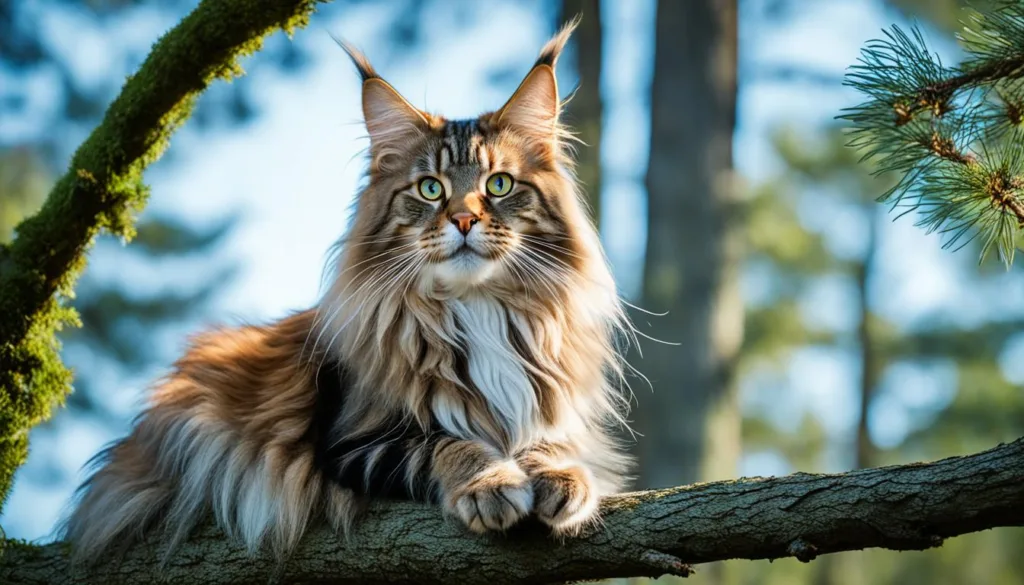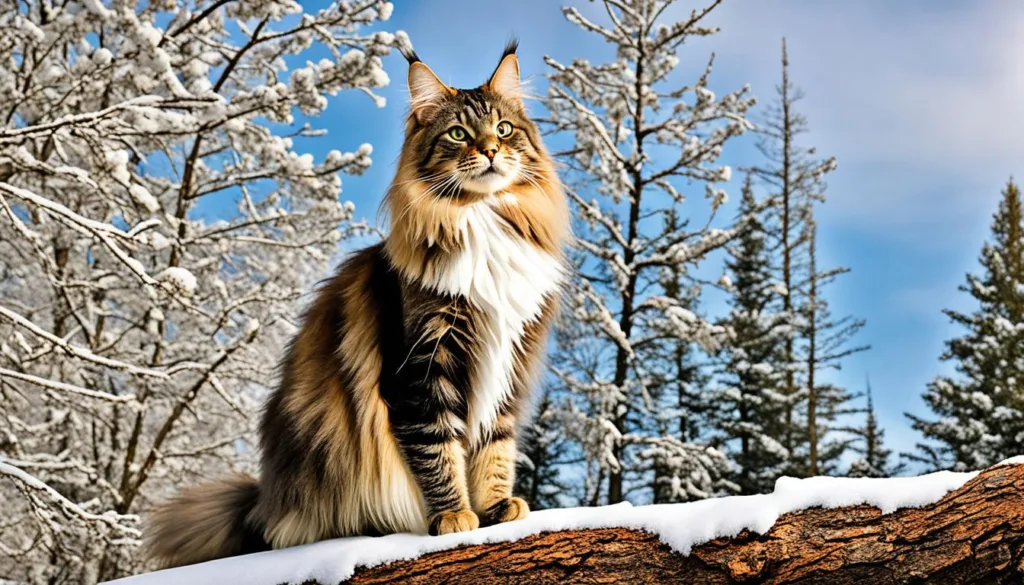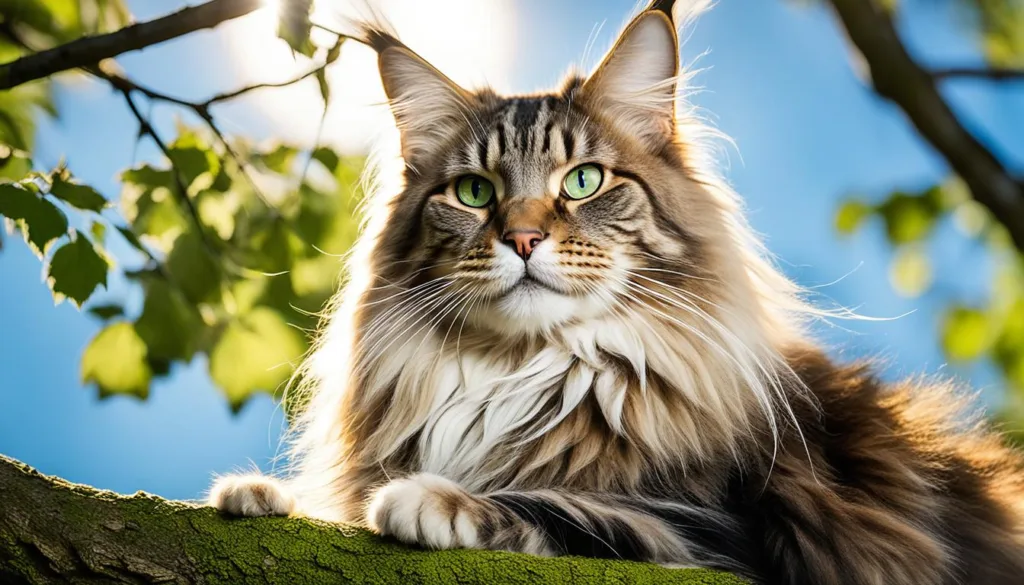The Maine Coon is a beloved cat breed known for its special traits and charming personality. These cats are unique among others. They have a mix of genetic traits that have won the hearts of cat lovers all over the world.
They are known for their large size and beautiful coats. Their friendly nature makes them stand out in the cat world.
This article will look into the genetic roots of the Maine Coon’s special qualities. We’ll see how DNA affects their looks and behavior. By understanding genetics and environment, we’ll learn what makes these cats so special.
Key Takeaways
- Maine Coons are known for their distinctive physical features and captivating personalities.
- Genetic traits play a crucial role in shaping the unique qualities of Maine Coons.
- The interplay between genetics and environment contributes to the extraordinary nature of Maine Coons.
- Exploring the genetic foundations of Maine Coons can provide insights into their size, coat, and behavioral traits.
- Appreciating the unique characteristics of Maine Coons can lead to a deeper understanding and appreciation of this remarkable breed.
The Essence of Uniqueness
Maine Coons are special because of their unique mix of looks and personality. They stand out with their big size, soft coats, and special ears. They are also known for being friendly, smart, and playful. This mix comes from their genes and the world around them.
Defining Unique Traits and Personalities
Maine Coons are big cats, with males weighing 14 to 20 pounds and females 10 to 14 pounds. Their big size and soft coats make them stand out. They are also loved for being friendly, smart, and playful, making great pets.
The Interplay of Genetics and Environment
What makes Maine Coons unique is the balance between their genes and their life experiences. Their genes set the stage for their looks and personality. But, the world around them shapes who they become. This mix of nature and nurture makes each Maine Coon special.
“Maine Coons are a true reflection of the harmonious blend between their genetic heritage and the environments in which they thrive, resulting in captivating felines that capture the hearts of their adoring owners.”
Genetic Foundations of Uniqueness
The Maine Coon’s unique traits come from their genes. Their DNA shapes their looks and behavior, making them special.
The Role of DNA in Physical and Behavioral Traits
Genes and their combinations in the Maine Coon’s DNA cause their big size, long fur, and tufted ears. These traits make them stand out. Their friendly, smart, and playful nature also comes from their genes.
Understanding Maine Coon Genetics
Exploring Maine Coon genetics reveals interesting facts. Cats have 19 pairs of chromosomes, with one pair deciding the cat’s gender. These genes affect their unique traits.
Breeders use tools like the Punnett Square to guess Maine Coon kitten coat colors. They know how dominant and recessive genes work together. The breed’s genetic diversity keeps its unique qualities.
Studying the Maine Coon’s genetics helps us appreciate their special qualities. It shows how their genes make them unique.
Life Experiences: Sculpting Individuality
Genetics set the stage for Maine Coons’ unique personalities. But, their life experiences are key to shaping who they are. The places they live, the friends they make, and the hurdles they jump over all play a part in making them special.
Where a Maine Coon lives, who they meet, and how much they interact with people matters a lot. Cats in lively homes might be more outgoing and bold. Those in quieter spots might be more to themselves.
The friends Maine Coons make, with both humans and other pets, shape them too. These relationships help form their unique traits. Every Maine Coon is special because of these connections.
Challenges and big events in a Maine Coon’s life also play a big role. Things like moving, health issues, or scary times can change them. These experiences help them learn how to cope and understand what they need.
Understanding how environment and life events shape Maine Coons helps us see how diverse they are. Each one’s story, blending genes and life, makes their personalities truly interesting.

“The environment in which a Maine Coon is raised can have a profound impact on its personality, just as the relationships it forms and the challenges it faces can sculpt its unique identity.”
Personality Traits: The Cornerstone of Distinctiveness
Maine Coons have a unique personality that makes them stand out. They fit into the five-factor model of personality, which includes openness, conscientiousness, extraversion, agreeableness, and neuroticism. This mix of traits makes them special.
The Five-Factor Model and Beyond
Maine Coons are curious and love to explore new things. They are careful with their grooming and solve problems on their own. These big cats also enjoy being around people and form strong bonds with them.
But there’s more to a Maine Coon’s personality than the five-factor model suggests. They are adaptable, loving, and playful. These traits make them wonderful pets around the globe.
Personality Development and Evolution
A Maine Coon’s personality comes from both their genes and their life experiences. Their natural traits, developed over centuries, shape their unique character. As they grow and face new situations, their personalities change and grow too.
Learning about Maine Coon personality traits helps us appreciate these amazing cats more. It shows us their incredible journey of self-discovery.
Talents and Skills: Honing Natural Abilities
The Maine Coon is a true renaissance cat, known for its impressive talents and skills. These cats have a mix of natural abilities and skills they’ve learned. This makes them versatile and interesting companions.
Innate Talents
Maine Coons have special innate abilities that make them stand out. They are great hunters, have amazing balance, and can adjust to many environments. These skills help them do well indoors and outdoors, making them skilled hunters and explorers.
Acquired Skills
Maine Coons also learn new skills through training and experience. They are smart and can solve problems, which helps them in activities like agility, obedience, and water sports. These skills show how versatile and adaptable Maine Coons are.
| Innate Talents | Acquired Skills |
|---|---|
| Hunting Instinct | Agility Training |
| Heightened Balance | Obedience Training |
| Environmental Adaptability | Water-related Sports |
The Maine Coon’s innate talents and acquired skills make them special. They are versatile and can do many things, impressing their owners and fans.
“The Maine Coon’s unique abilities are a testament to their exceptional nature, making them one of the most captivating and multi-faceted cat breeds in the world.”
Perspectives: Shaping Worldviews
Maine Coons have a special way of seeing the world. This comes from their genes, life stories, and the culture around them. They see things differently than other cats, giving them a unique view of life.
Their genes play a big part in their outlook. They shape their looks and how they act and feel. This means they might tackle problems and connect with people in special ways.
But it’s not just their genes. What they experience in life also shapes their view. They learn and grow, making them see the world in their own way. They’re curious and playful, which helps them understand their spot in the world.
Also, the culture around them affects their beliefs and values. The traditions and norms of their area can influence them. This adds depth to their personalities, making them more interesting.
Looking into what shapes Maine Coons’ views helps us appreciate their diversity. Their unique outlooks make them great friends and remind us of the beauty of cats.

“The Maine Coon’s perspective on the world is a captivating blend of genetic predispositions, life experiences, and cultural influences, creating a truly unique and multifaceted outlook on life.”
Relationships: Catalysts for Growth and Transformation
Maine Coons form deep bonds with humans and other cats. These relationships help them grow and change. They shape their unique personalities and affect their happiness.
The Impact of Social Connections
Maine Coons love being around others. They get a lot of emotional and mental support from their friends. This makes them feel safe, part of a group, and trusted.
They learn a lot from their relationships. They get better at talking and understanding others’ feelings. This helps them be more social and smart.
Navigating Relationship Dynamics
Maine Coons have complex relationships. They need to change and grow with each situation. They can be playful with other cats or very close with their humans.
This skill helps them keep good relationships. It also lets them discover more about who they are and how they grow.
Maine Coon relationships deeply affect their growth. This shows how complex and rich their social lives are.
“Maine Coons are not just pets, but cherished companions who shape our lives in profound and meaningful ways.”
Embracing Individuality: A Celebration of Diversity
The Maine Coon breed shows off the beauty of individual uniqueness. Each cat is special, with its own look, personality, and experiences. This section will highlight the Maine Coon’s diversity, showing why each cat is so unique and interesting.
Maine Coons have a wide range of eye colors, like blue, green, yellow, and amber. These colors come from a pigment called lipochrome. Age, genes, and health can change a Maine Coon’s eye color, making each one unique.
Maine Coons are known for their long, flowing coats. Some have curly or wavy hair, and a few are even hairless, like the Sphynx. Their coats come in many patterns, including tabby, spots, and tortoiseshell.
“Each Maine Coon is a masterpiece, a living testament to the wonders of nature and the infinite possibilities of individual expression.”
Maine Coons have different personalities too. Some are playful, while others are more quiet and independent. Their unique traits come from their genes and life stories, making them great pets and family members.
Let’s celebrate the Maine Coon breed’s diversity and each cat’s individuality. Embracing our differences shows the true beauty and richness of this amazing cat species.
Conclusion
Maine Coons have unique traits thanks to their genetics and environment. They stand out with their wide coat colors and patterns. Each Maine Coon is special, with its own story.
Understanding Maine Coon genetics helps us see how diverse they are. Genes like the Melanocortin 1 receptor (MC1R) and others shape their looks and personalities. These genes, along with life experiences, make each Maine Coon unique.
Let’s celebrate Maine Coons for their diversity. By valuing their individuality, we learn to appreciate the beauty of diversity. This makes the Maine Coon breed truly remarkable in our lives.
FAQ
What makes Maine Coons unique?
What role does genetics play in shaping Maine Coons’ unique qualities?
How do environmental factors and life experiences influence Maine Coons’ individuality?
What personality traits are characteristic of Maine Coons?
What are some of the diverse talents and skills that Maine Coons possess?
How do Maine Coons’ perspectives and worldviews shape their unique identities?
How do relationships impact the growth and transformation of Maine Coons?
What is the remarkable diversity observed within the Maine Coon breed?
Source Links
- https://www.westeros.no/maine-coon/history/
- https://purebredkitties.com/blogs/maine-coon/understanding-the-unique-traits-that-make-maine-coons-so-big?srsltid=AfmBOoomJJHLX7V04uEMJfJFNr8e8LxlLmKuexVBYtCwD3Q7vMR4QHmQ
- https://mainecoon.org/maine-coon-genetics/
- https://meowoff.us/discover-the-unique-characteristics-of-maine-coon-cats/
- https://meowoff.us/unraveling-the-majesty-a-comprehensive-guide-on-the-physical-characteristics-of-maine-coons/
- https://thecatsite.com/c/maine-coon-cats/
- https://kingsize-cat.ru/en/articles/useful-articles/cats-genetics.html
- https://www.catterymacadamia.com/post/genetic-diversity-of-the-maine-coon
- https://www.idsva.edu/discover/dissertation-abstracts?b800947d_page=2
- https://www.ncbi.nlm.nih.gov/pmc/articles/PMC7234821/
- https://cfa.org/wp-content/uploads/2024/06/20050205-transcript.pdf

